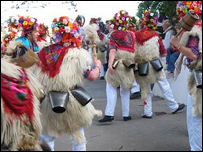|
Româna
The Istro-Romanian
Dialect at the Brink of Extinction
Synopsis
| Sound Clip |
Photo Album
©
BBC-Romania.com
October 5, 2005
 The Romanian language is about to loose one of its dialects. Istro-Romanian is the least spoken of the four dialects of Romanian. Today, less then 500 people still speak the language in the Istrian region of Croatia. UNESCO has listed the Istro-Romanian dialect in its Red Book of Endangered Languages as a seriously endangered language. The Romanian language is about to loose one of its dialects. Istro-Romanian is the least spoken of the four dialects of Romanian. Today, less then 500 people still speak the language in the Istrian region of Croatia. UNESCO has listed the Istro-Romanian dialect in its Red Book of Endangered Languages as a seriously endangered language.
Today there are only two villages where the dialect is still spoken: in Žejane and in Šusnjevica.
Is it possible to save the IstroRomanian dialect?
The IstroRomanians: The Last Two Villages
The origin of the this small Romanian colony is lost in the mist of time and to this day researchers disagree on this subject.
Most likely, about 500 years ago a Romanian population fleeing the Turkish invasion sought refuge and settled in a few small villages north and south of Mount Učka, in the Istrian Peninsula.
Over time the Istro-Romanian dialect came under the strong influence of the Croatian spoken by the majority of the neighboring population.
Nowadays a Romanian may have a hard time understanding the dialect, but at the same time he or she may be surprised to recognized entire Romanian sentences in the language spoken in Žejane or Šusnjevica.
The Istro-Romanian dialect can be easily recognized by changing the sound "n" with the sound "r". Thus, Istro-Romanians would pronounce "bire" instead of "bine" or "spure" instead of "spune".
After Istria was occupied by Tito's troops and the region became part of Yugoslavia, many Istro-Romanians chose to emigrate to the United States and Italy. The number of those left behind is worrisome.
Even from those that stayed behind, many have moved from their native villages to the nearby cities in search of better jobs.
As a result the Istro-Romanians have lost the possibility to study in Romanian or in their native dialect.
In the last few years the officials in Bucharest have done too little for the Istro-Romanian community. All that Romania has done for them were empty promises and festive visits that had no concrete results.
And the Croatian authorities were by no means more helpful.
"We have funds and we would make them available for the Istro-Romanian community if they were to organize themselves and ask for them, which has yet to be the case," said the president of the local Council of Kršan district which also includes the Istro-Romanian village of Šusnjevica.
Until then and without any support, the language in the Istro-Romanian villages will die out. There are no publications, there is not even a radio station and there are no classes in the dialect.
On the other hand, the Istro-Romanians are lucky to have Mauro and his famous folk group, the "Žejanski zvončari" or "Žejane's Bell Ringers". The group is well known not only in Croatia but even abroad.
Dresses in sailors’ shirts with a heavy shepherd’s coat on top and a belt adorned with huge bells, the bell ringers move to the beat of a tribal dance. In the deafening sound of the bells, they go from house to house to bring good luck.
The members of the "Žejane's Bell Ringers" have done quite a bit to help maintain the Istro-Romanian dialect. They have translated in the dialect, many of the regional songs and recorded a CD which is available for those who may wish to listen to their music.
Professor Petru Neiescu from the Linguistic Institute for Literary History from Cluj-Napoca, Romania believes that "this is not enough to save the dialect". He's been studying the dialect since 1962.
He is convinced that it is now too late to save the Istro-Romanian dialect. We may only delay its extinction. Professor Neiescu also believes that in two or three generations everybody will be speaking only in Croatian.
Even so, on the streets of Šusnjevica I was able to find a small boy who, with the help of his father, was able to count to
ten in the dialect. However, he knew the numbers eight and nine only in Croatian.
Source:
- BBC Romania - https://www.bbc.co.uk/romanian/news/story/2005/10/051005_istro_roman.shtml
|